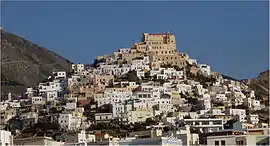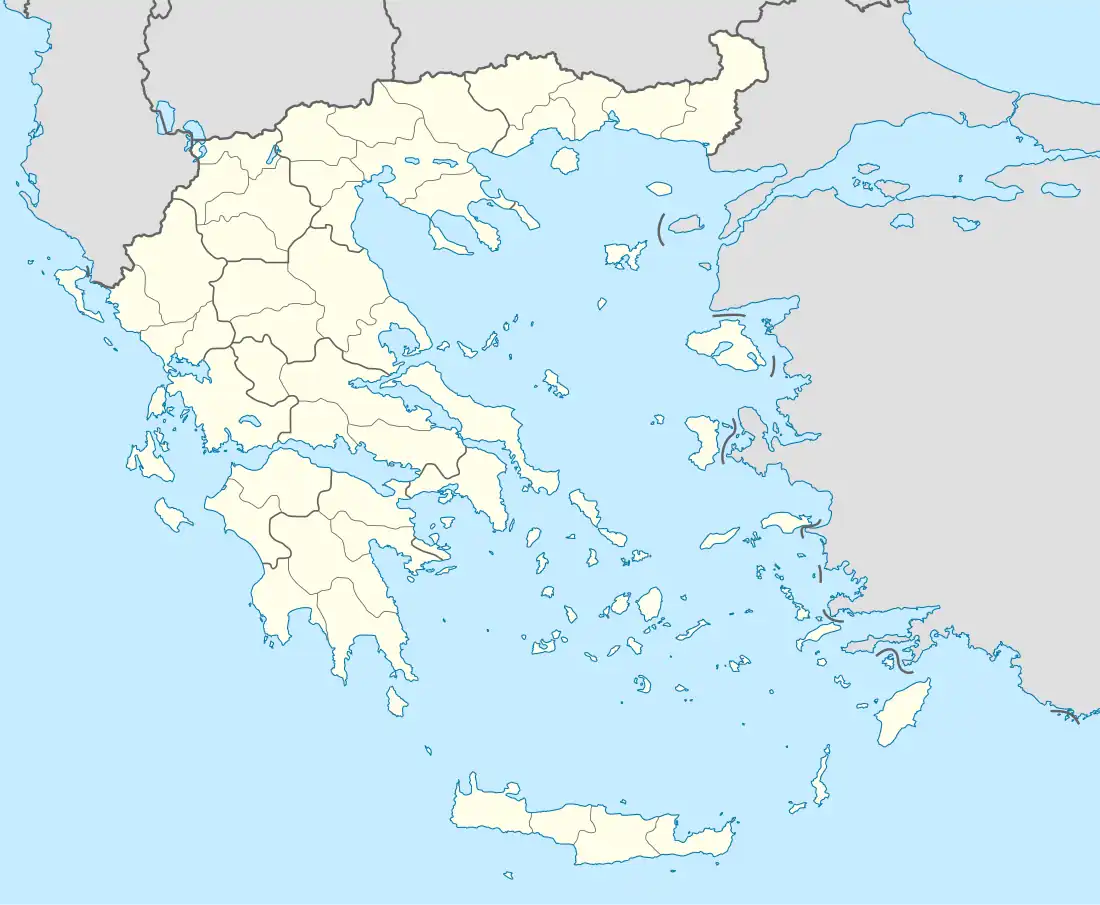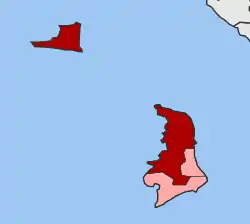Ano Syros
Ano Syros (Greek: Άνω Σύρος, “Upper Syros”) is a town and a former municipality on the island of Syros, in the Cyclades, Greece. Since the 2011 local government reform it is part of the municipality Syros-Ermoupoli, of which it is a municipal unit.[2] The municipal unit includes the uninhabited islands Gyaros (lying to the northwest of Syros) and Varvaroúsa. Population 3,877 (2011 census); land area 67.014 square kilometres (25.874 square miles).[3] The municipal unit shares the island of Sýros with the municipal units of Ermoupoli and Poseidonia.
Ano Syros
Άνω Σύρος | |
|---|---|
 General view of Ano Syros | |
 Ano Syros Location within the regional unit  | |
| Coordinates: 37°28′N 24°56′E | |
| Country | Greece |
| Administrative region | South Aegean |
| Regional unit | Syros |
| Municipality | Syros-Ermoupoli |
| • Municipal unit | 67.0 km2 (25.9 sq mi) |
| Population (2011)[1] | |
| • Municipal unit | 3,877 |
| • Municipal unit density | 58/km2 (150/sq mi) |
| Community | |
| • Population | 2,133 (2011) |
| Time zone | UTC+2 (EET) |
| • Summer (DST) | UTC+3 (EEST) |
| Vehicle registration | EM |
History
Ano Syros is the medieval settlement of Syros. It is built during later Byzantine era or early Frankokratia. It is a classical cycladic medieval settlement that is densely built with narrow roads, circular order and a radial street plan.[4] The overall effect reminds a fortified citadel. Ano Syros is inhabited by Catholic Greeks. The reason for it is the long period of Frankokratia in Syros that started immediately after the fourth crusade. Frankokratia ended during 16th century but the Catholics of Syros came under France protection and the Catholic religion survived in the island.[5] After founding of nearby Hermoupolis, Ano Syros ceased to be the administrative centre of Syros. Nevertheless, the settlement remained a religious centre since it is the seat of Roman Catholic Diocese of Syros and Milos.
During WW2 the city was occupied by the Italians, who wanted to create an Italian province with administrative capital in Ano Syros:
Among the civilian population there was a substantial approval of the Italian presence only in the area of the capital of Siro and in the island of Tino, where many boasted distant Venetian roots and were numerous Catholics for centuries - especially in the town "Ano Syros", founded in 1200 by the Venetians. Ano Syros, the Catholic stronghold in Siro, supported the Italianization of the Cyclades even if moderately: this was assisted by the Italian authorities and did not suffer death from the famine that damaged the Greek population especially in February 1942. Many Catholic inhabitants of Ano Syros (and someone from Tino) were later imprisoned by the Greeks (Orthodox) with the charge of collaborationism in 1945. BD[6]
Places of interest
- Church of Saint George: The church is built in the top of the hill of Ano Syros. It was originally built in 1208 but has been destroyed three times since and has been rebuilt.[7]
- Capuchin monastery: It is a catholic monastery that was founded in 1637.[8]
- Vamvakaris museum: It is a museum dedicated to Markos Vamvakaris
Twin towns — sister cities
Ano Syros is twinned with:
People
References
- "Απογραφή Πληθυσμού - Κατοικιών 2011. ΜΟΝΙΜΟΣ Πληθυσμός" (in Greek). Hellenic Statistical Authority.
- "ΦΕΚ B 1292/2010, Kallikratis reform municipalities" (in Greek). Government Gazette.
- "Population & housing census 2001 (incl. area and average elevation)" (PDF) (in Greek). National Statistical Service of Greece. Archived from the original (PDF) on 2015-09-21.
- "Syros". Foundation of the Hellenic world. Archived from the original on 3 July 2015. Retrieved 24 December 2014.
- "Ano Syros". hermoupolis.gr. Archived from the original on 15 January 2015. Retrieved 24 December 2014.
- Italian occupationof Ano Syros
- "Ιστορία Άνω Σύρου". teipir.gr. Archived from the original on 24 December 2014. Retrieved 24 December 2014.
- "Μοναχικά τάγματα και ιερές μονές". cathecclesia.gr. Archived from the original on 4 March 2016. Retrieved 24 December 2014.
- "Twinnings" (PDF). Central Union of Municipalities & Communities of Greece. Archived from the original (PDF) on 2017-06-30. Retrieved 2013-08-25.